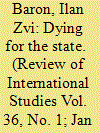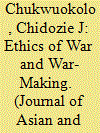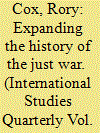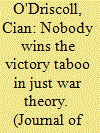| Srl | Item |
| 1 |
ID:
093793


|
|
|
|
|
| Publication |
2010.
|
| Summary/Abstract |
This article introduces the problem of having to risk one's life for the state in war, asking first why this question is no longer asked in the just war literature and then suggesting five issues that relate to this question: 1) that of individual consent, 2) whether or not any state can be justified in obliging its citizens in this regard and whether or not the type of government is important, 3) whether or not the problem of the obligation differs between conscript and volunteer armies, 4) the problem of political obligation and how any individual could be justifiably obliged to risk his or her life for the state in war, and 5) the question of whether a citizen may be obliged to go into any war. The argument is that these questions are no longer given much attention in the just war literature because of the way that the concept of proper authority has come to be understood. The article concludes by suggesting that the problem of the 'obligation to die' should be included in our understanding and use of just war theory and the ethics of war.
|
|
|
|
|
|
|
|
|
|
|
|
|
|
|
|
| 2 |
ID:
183677


|
|
|
|
|
| Summary/Abstract |
Wars are cataclysmic events that inflict horrendous damage on people and society. In the case of the two World Wars whose magnitudes were global, and manners of prosecution total, this assertion pales in logic. The dangers that a future global war could pose for humanity given the tremendous leaps forward in the science and technology of warfare and weapons since the last World War are tremendous. This paper aims to use the examination of the ethics of war and warfare as backdrop on the analytical assessment of the implications of the exclusion of Africans from both the memorial and monuments that honor soldiers and their service in the two World Wars, even though their service and sundry contributions are salient and tremendous. The paper calls up the issue of racial identity in both Wars in puzzles: Do African soldiers in the Wars share a common humanity with their White counterparts? If they do, another puzzle is the following: Why then is their service still being commodified, to the extent of exclusion in memorials and monuments to soldiers that served and died in both Wars? The damning extrapolation from these puzzles is that there is still the belief albeit erroneous, in the establishment circles that regardless of the facts of history about the Wars, Africans are still viewed as lacking in contributions to the resolution of the threats that the World Wars represented to global peace. To reposition that under laying mind-set, the paper recommends the inclusion of African values of complementarity and inclusiveness in the quest for lasting global peace and the prevention of future Wars.
|
|
|
|
|
|
|
|
|
|
|
|
|
|
|
|
| 3 |
ID:
155495


|
|
|
|
|
| Summary/Abstract |
This article expands our understanding of the historical development of just war thought by offering the first detailed analysis of the ethics of war in ancient Egypt. It revises the standard history of the just war tradition by demonstrating that just war thought developed beyond the boundaries of Europe and existed many centuries earlier than the advent of Christianity or even the emergence of Greco-Roman doctrine. It also argues that the creation of a prepotent ius ad bellum doctrine in ancient Egypt—based on universal and absolutist claims to justice—hindered the development of ius in bello norms in Egyptian warfare. I contend that this development prefigures similar developments in certain later Western and Near Eastern doctrines of just war and holy war.
|
|
|
|
|
|
|
|
|
|
|
|
|
|
|
|
| 4 |
ID:
169104


|
|
|
|
|
| Summary/Abstract |
This article examines how scholars of the just war tradition think about the ethical dilemmas that arise in the endgame phase of modern warfare. In particular, it focuses upon their reticence to engage the idiom of ‘victory’. Why, it asks, have scholars been so reluctant to talk about what it means to ‘win’ a just war? It contends that, while just war scholars may have good reason to be sceptical about ‘victory’, engaging it would grant them a more direct view of the critical potentialities, but also the limitations, of just war reasoning.
|
|
|
|
|
|
|
|
|
|
|
|
|
|
|
|